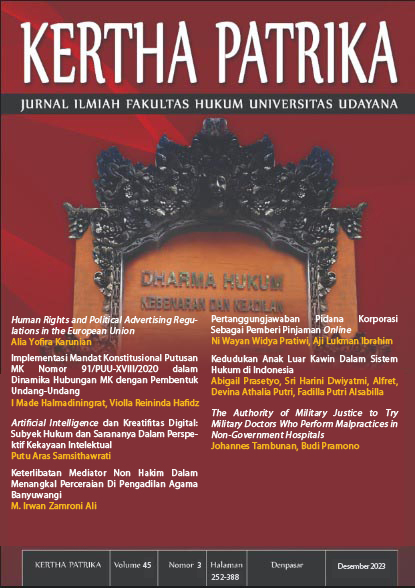Implementasi Mandat Konstitusional Putusan MK Nomor 91/PUU-XVIII/2020 dalam Dinamika Hubungan MK dengan Pembentuk Undang-Undang
Abstract
The discrepancy between Constitutional Court Decision Number 91/PUU-XVII/2020 on the review of the Job Creation Law and the PERPPU on Job Creation has created constitutional incompatibilities. The research aims to analyze the executorial power in the final and recall nature of the Constitutional Court's decision on the follow-up of the Constitutional Court's decision by the legislators and (ii) the implementation of the constitutional mandate of Constitutional Court Decision Number 91/PUU-XVIII/2020 on Job Creation in the Job Creation PERPPU in the dynamics of the relationship between the Constitutional Court and the legislators. This research uses a combination of normative-doctrinal methods using a contextual approach, legislative approach, conceptual approach and case approach. The results of this study indicate that the Constitutional Court's decision has executorial power over the final and binding nature erga omnes. The Constitutional Court's conditional unconstitutional decision regarding the formal examination of the Job Creation Law has shifted the role of the Constitutional Court as a positive legislature which also results in the nature of the Constitutional Court's decision as a quasi-law. Follow-up of the Constitutional Court's decision is also considered important as compliance with the constitution. This research also shows that there is a mismatch between the constitutional mandate in Constitutional Court Decision Number 91/PUU-XVII/2020 and the follow-up carried out by the President as one of the branches of lawmaking power. This mismatch is clearly a form of constitutional delegitimization and straddles the final and binding Constitutional Court decision.
Downloads
References
Albo, G., & Fanelli, C. (2015). Penghematan Melawan Demokrasi: Fase Otoriter Neoliberalisme.
Jakarta: Indoprogress
Apeldoorn, A. (2017). Pengantar Ilmu Hukum. Jakarta: Pradnya Paramita
Asshiddiqie, J. (2006). Pengantar Ilmu Hukum Tata Negara. Jakarta: Konstitusi Press
____________. (2010). Konstitusi dan Konstitusionalisme Indonesia. Jakarta: Konpress
Benda, E. (2005). Pelaksanaan Keputusan Mahkamah Konstitusi di Negara-Negara Transformasi
dengan Contoh Indonesia. Jakarta: Konrad Adenauer Stiftung
Brewer-Carías, A. (2011). Constitutional Courts as Positive Legislators: A Comparative Law
Study. Cambridge: Cambridge University Press
Butt, S. (2015). The Constitutional Court and Democracy in Indonesia. Leiden: Brill
Fallon, Jr, R.H. (2001). Implementing The Constitution. Cambridge: Harvard University
Ginsburg, T. (2003). Judicial Review in New Democracies, Constitutional Court in Asian Cases.
Cambridge: Cambridge University Press
Hamilton, A. (2008). “The Federalist Paper” dalam Maruarar Siahaan, Undang-Undang
Dasar 1945 Konstitusi Yang Hidup.Jakarta: Sekretariat Jenderal dan Kepaniteraan
Mahkamah Konstitusi
Harahap, Y. (1997). Beberapa Tinjauan Mengenai Sistem Peradilan & Penyelesaian Sengketa.
Bandung: Citra Aditya Bakti
Harman, B.K. Peranan Mahkamah Konstitusi Dalam Mewujudkan Reformasi Hukum,
dalam Harun, R., Husein, Z.A.M., & Bisariyadi (eds). (2004). Menjaga Denyut
Konstitusi: Reflexi satu tahun Mahkamah Konstitusi. Jakarta: Konstitusi Press
Hartono, D. dalam Tim Penyusun. (2010). Naskah Komprehensif Perubahan Undang-Undang
Dasar 1945: Latar Belakang, Proses, dan Hasil Pembahasan 1999-2002. Jakarta:
Sekretariat Jenderal dan Kepaniteraan Mahkamah Konstitusi
Hendrianto, S. (2018). Law and Politics of Constitutional Court: Indonesia and the Search for
Judicial Heroes. New York: Routledge
Hirschl, R. (2014). Comparative Matters: The Renaissance of Comparative Constitutional Law.
Oxford: Oxford University Press
Horowitz, D.L. (2013). Constitutional Change and Democracy in Indonesia. New York:
Cambridge University Press
Huda, N. (2012). Hukum Tata Negara Indonesia. Jakarta: Rajawali Pers
Huijbers, T. (1982). Filsafat Hukum Dalam Lintas Sejarah. Yogyakarta: Kansius
Ifani, I., & Hasani, I. (2018). Laporan Kinerja Mahkamah Konstitusi 2015-2016: Mendorong
Kepatuhan Lembaga Negara Pada Putusan Mahkamah Konstitusi. Jakarta: Pustaka
Masyarakat
Martitah. (2013). Mahkamah Konstitusi: Dari Negative Legislature ke Positive Legislature.
Jakarta: Konstitusi Press
MD, M.M. (2013). Problematika Putusan Mahkamah Konstitusi yang Bersifat Positive
Legislature, dalam Martitah, Mahkamah Konstitusi Dari Negative Legislature ke
Positive Legislature. Jakarta: Konstitusi Press
Ibrahim, J. (2007). Teori & Metodologi Penelitian Hukum Normatif. Malang: Bayumedia
Publishing
Isra, S. (2010). Pergeseran Fungsi Legislasi: Menguatnya Model Legislasi Parlementer Dalam
Sistem Presidensial Indonesia. Jakarta: Rajawali Pers
Kelsen, H. (1973). General Theory of Law and State. New York: Russel & Russel
Kusuma, R.M.A.B. (2011). Sistem Pemerintahan “Pendiri Negara” Versus Sistem Presidensial
“Orde Baru”, Jakarta: FH UI
Rohdewohld, R. (1995). Public Administration in Indonesia. Melbourne: Montech Pty Ltd
Sartori, G. (1997). Comparative Constitutional Engineering: An Inquiry Into Structures,
Incentives, and Outcomes. New York: New York University Press
Soemantri, S. (1986). Hak Menguji Material di Indonesia. Bandung: Alumni
Soekanto, S., & Mamudji, S. (2011). Penelitian Hukum Normatif. Jakarta: Raja Grafindo
Persada, Jakarta
Siahaan, M. (2005). Hukum Acara Mahkamah Konstitusi Republik Indonesia. Jakarta:
Konstitusi Press
Tocqueville, A.D. (1956). Democracy in America, Specially Edited and Abridge for the Modern
Reader by Richard D. Heffner. New York: A Mentor Book Published by The New
American Library
Jurnal
Ali, M.M., Hilipito, M.R., & Asy’ari, A. (2015). Tindak Lanjut Putusan Mahkamah
Konstitusi yang Bersifat Konstitusional Bersyarat Serta Memuat Norma Baru.
Jurnal Konstitusi 12(3), 631-662. doi: https://doi.org/10.31078/jk12310,
Asy’ari, S., Hilipito, M.R dan Ali, M.M. (2013). Model dan Implementasi Putusan
Mahkamah Konstitusi dalam Pengujian Undang-Undang (Studi Putusan Tahun
2003-2012). Jurnal KonstitusI, 10(4), 675-708. doi:
https://doi.org/10.31078/jk1046
Cahyono, M. (2022). Mengoptimalkan Tingkat Kepatuhan Pembentuk Undang-Undang
Terhadap Putusan Mahkamah Konstitusi Melalui Metode Weak-Form Review.
Jurnal Rechtsvinding, 11(1), 1-17
Damian, E., & Hornick, R.N. (1972). Indonesia’s Formal Legal System: An Introduction.
American Journal of Comparative Law, 20(3), 492-530. doi:
https://doi.org/10.2307/839317
Dressel, B. (2018). Megapolitical Cases Before the Constitutional Court of Indonesia Since
2004: An Empirical Study. Constitutional Review, 4(2), 157-187. doi:
https://doi.org/10.31078/consrev421
Gardbaum, S. (2015). Are Strong Constitutional Courts Always a Good Thing for New
Democracies? Columbia Journal of Transnational Law 53
Hakim, A.R., & Pratiwi, Y.D. (2022). Positive Legislature dalam Putusan Mahkamah
Konstitusi Mengenai Upaya Hukum Putusan Penundaan Kewajiban
Pembayaran Utang. Jurnal Konstitusi, 19(4), 933-956. doi:
https://doi.org/10.31078/jk1949
Indrayana, D., & Mochtar, Z.A. (2007). Komparasi Sifat Mengikat Putusan Judicial Review
Mahkamah Konstitusi dan Pengadilan Tata Usaha Negara. Mimbar Hukum, 19(3),
437-454. doi: https://doi.org/10.22146/jmh.19074
Kurniawan, I.G.A. (2022). Putusan Mahkamah Konstitusi Terhadap Undang-Undang
Cipta Kerja Dalam Perspektif Filsafat Utilitarianisme. Jurnal USM Law Review,
5(1), 282-298. doi: http://dx.doi.org/10.26623/julr.v5i1.4941
Laruffa, F. (2022). Neoliberalism, Economization and the Paradox of the New Welfare
State. European Journal of Sociology, 63(1), 131-163. doi:
https://doi.org/10.1017/S0003975622000169











